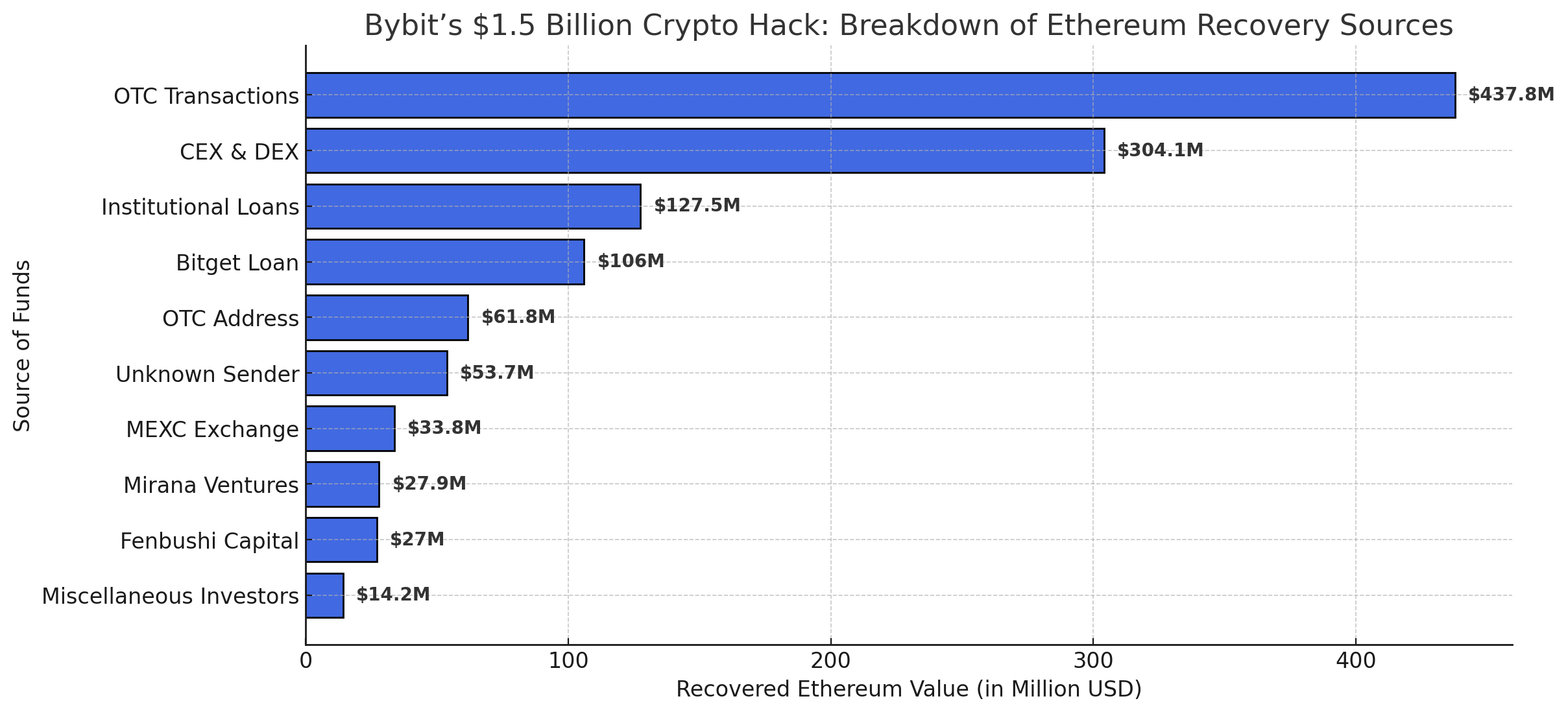Ben Zhou, CEO of the cryptocurrency derivatives exchange Bybit, has announced that the platform’s Ethereum security deposit has been completely restored after a hacking incident caused the loss of almost $1.5 billion worth of digital assets. For added transparency and confidence in our users, we will soon share an independently audited Proof-of-Reserves (PoR) report.

This audit will confirm that all user funds have been secured on a 1:1 basis, maintaining fiscal soundness. Bybit has shown its side of prudence by taking this immediate action in the sight of security and a desire for trust.
The Biggest Crypto Heist of All Time
Hackers stole over 400,000 Ethereum (ETH) from Bybit’s cold wallet in an elaborate attack, one of the largest thefts in the history of the cryptocurrency market. The breach happened when hackers transferred funds out from an “offline” “cold” wallet to a “warm” (aka daily trading wallet). Exploiting security controls, the attackers were able to pass in a manipulated transaction when transferring the funds to an unknown address.

Steady Response & Assurance To Users
In light of the pathway this broke, Bybit’s CEO Ben Zhou immediately informed users that the platform was solvent and that it was focused on protecting client funds, given the scale of the theft. “All client assets are 1:1 backed; even if we don’t recover the loss from the hack, Bybit is solvent,” he said on social media. We can cover the loss.” This assurance was critical in keeping users’ faith during the controversy.

Team Up to Refill Ethereum Bag
Based on the deficit created by the hack, Bybit took a range of proactive measures to restore its ETH reserves.
OTC Transactions: The single largest share of the replenished funds—about 157,660 ETH (worth $437.8 million)—was captured via OTC transactions.
Centralized and Decentralized Exchanges: As part of Bybit наскорот еври́ка, the platform purchases around 109033 Ethereum from all বিগভ্যালেটস and a way Бинанса to support агенты.
Institutional Loans and Investments: Among contributors are institutional partners providing loans, such as a 40,000 ETH loan (worth $106 million) from crypto exchange Bitget and 47,800 ETH (around $127.5 million) from nameless institutions or whales.
Other Support: Other sizable deposits included 22,609 ETH ($61.8 million) from a possible OTC address, 20,000 ETH ($53.7 million) from an unknown address, and from MEXC, Mirana Ventures, and Fenbushi Capital.
PoR Audit To Be Conducted Soon
Demonstrating its commitment to transparency, Bybit stated that it will release an audited Proof-of-Reserves (PoR) report. This audit will offer proof that every client asset is 100% funded 1:1, acting as an additional building block towards trust and safety on the platform. Step 4. As an extra layer of security, the PoR process will be cryptographically secure and subject to external reviews to ensure its integrity.
Support from Industry and Enhanced Security Measures
Key players have rallied around Bybit, allowing its colleagues in the crypto community to quickly recover the platform. They are working with blockchain forensic experts to track down the stolen funds and the perpetrators. Initial investigations indicate that the North Korean Lazarus Group may have been involved; the group is infamous for previous massive cyber heists.
Bybit also stated the breach has led them to strengthen their security infrastructure to prevent future incidents. These efforts involve conducting thorough assessments of our existing procedures, adopting new cutting-edge security technologies, and maintaining a partnership with leading cybersecurity professionals to build an increasingly durable defense around the platform.

Bybit Stays Tough, Users Remain Confident
The unprecedented hack marks a tough time for the exchange, but Bybit’s quick and transparent response highlights its resilience and allegiance to its user base. The upcoming PoR audit, in conjunction with the successful restocking of Ethereum reserves, is intended to recover and strengthen user trust. Their focus on improving security and working with industry counterparts allows the platform to set a benchmark for crisis handling and clarity within the cryptocurrency scene.
Note: This article is written with reference to credible sources, including but not limited to The Guardian, Associated Press, and Bybit’s official statements.
Stay connected with TurkishNY Radio by following us on Twitter and LinkedIn, and join our Telegram channel for more news.
FAQs
1. What led to the $1.5 billion Fidelity Trading Breach?
During a standard wallet transfer, the platform’s security was breached, allowing attackers to exploit weaknesses and withdraw digital assets from cold storage.
2. How did the company recover its lost digital properties?
Institutional loans, investor contributions, direct purchases on the market, and over-the-counter transactions allowed the firm to replenish its reserves while securing about $1.23 billion in recovered assets.
3. Is the platform’s asset verification report going to protect the users?
Yes, the audit that is about to release will verify 100% asset backing, providing peace of mind and reassuring the users of the financial integrity and operational safety of the platform.
4. What has been done to ensure that the breaches do not recur?
The company also upgraded wallet security and implemented fortified protocols, partnering with forensic experts while tracking stolen funds to protect the overall system.
Glossary of Key Terms
1. Cold Wallet: A cold means of highly secure offline storage used to protect digital assets from cyberattacks by holding the coins outside of the internet.
2. Decentralized Exchange (DEX): It is a decentralized exchange that enables individuals to exchange digital assets with one another without the need for intermediaries, boosting security and privacy.
3. Digital Forensics: Data up to 2023 October 2023 October 2023 October
4. Institutional Loan: A cross-entity borrowing scheme where finance companies provide money or other resources for a company’s working capital.
5. Over-the-Counter (OTC) Transactions: Exchange transactions that occur between 2 parties without using public exchanges to trade large volumes of an asset securely.
6. Phishing Attack: Cyberattack: Hackers trick people into giving up sensitive information—like security credentials.
7. Proof-of-Reserves (PoR): If a platform does not have a fully backed balance, it can conduct what is called a cryptographic audit where independent parties can confirm that the platform has more than enough assets to cover all user balances.
8. Smart Contract Exploit: Hack based on vulnerabilities of self-enforce contracts in the blockchain, transfer funds without permission, security loophole.























































































![BitTorrent [New]](https://s2.coinmarketcap.com/static/img/coins/64x64/16086.png)





















